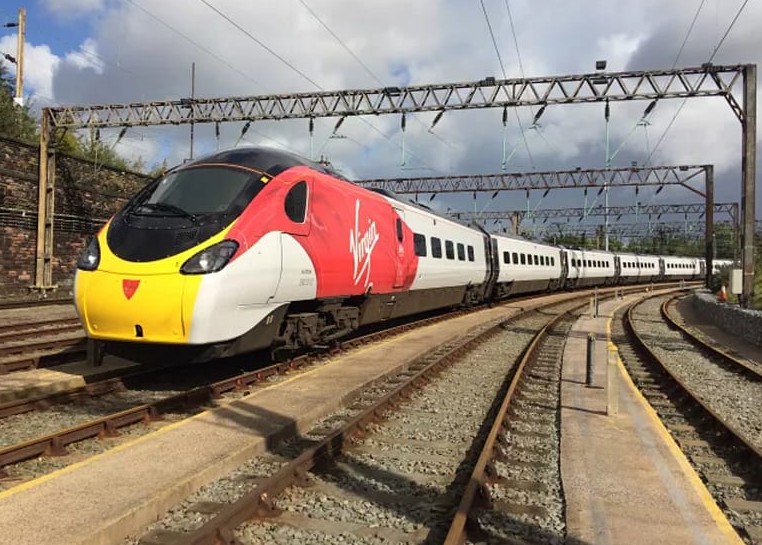Virgin Train Sets Sights on Cross-Channel Rivalry as Eurostar Competition Gets Green Light
In what’s being hailed as a “major breakthrough” for British rail, Sir Richard Branson’s Virgin train brand has finally received the green light to compete head-to-head with Eurostar, with sleek, high-speed services set to roll out by 2030.
The approval, issued by the Government’s Office of Rail and Road (ORR), allows Virgin to use the Temple Mills International Depot in east London, a vital maintenance hub for its upcoming fleet of 12 trains.
The site, hotly contested by Eurostar’s rivals, had long been seen as a stumbling block to launching new cross-Channel services.
With this regulatory hurdle cleared, Virgin can now press ahead with plans to operate direct trains from London St Pancras to major European cities, opening the next chapter in Britain’s high-speed rail story.
Sir Richard Branson welcomed the ORR’s decision, describing it as a victory for competition and travelers alike.
“The ORR’s decision is the right one for consumers; it’s time to end this 30-year monopoly and bring some Virgin magic to the cross-Channel route.
Virgin is no stranger to delivering award-winning rail services, and just as we have successfully challenged incumbents in air, cruise and rail, we’re ready to do it again.
We’re going to shake up the cross-Channel route for good and give consumers the choice they deserve.”
Virgin has already inked a deal with Alstom, the French train manufacturer, to supply 12 Avelia Stream high-speed trains, the same cutting-edge model used for top-tier European routes.
The firm’s submission to the ORR detailed plans to run services along HS1, linking London St Pancras through Kent and the Channel Tunnel, with operations expected to commence in five years.
The move marks the first serious challenge to Eurostar’s dominance since 1994. Virgin’s return to the rail sector, after its successful run of domestic services between 1997 and 2019, has been met with enthusiasm from industry watchers and passengers alike.
Virgin also plans to integrate journeys with its Virgin Red rewards scheme, allowing travelers to earn points across the wider Virgin Group.
The company has hinted at a more enjoyable onboard experience, promising to inject what it calls a bit of “joy” back into rail travel.
According to insiders, Virgin is exploring potential routes from Birmingham and Manchester to the continent, expanding well beyond the capital.
Current proposals include routes to Paris, Brussels, and Amsterdam, with possible future links to Germany and Switzerland.
A stop in Kent is also being considered, depending on whether Ashford International and Ebbsfleet International stations reopen for international services.
A Virgin representative confirmed: “Reopening the stations to be able to accommodate international services requires commitment and resources from all parties and potential competitors involved. But if the stations are opened, Virgin will stop in Kent.”
Industry sources say these additional stops could help Virgin secure full approval from the Department for Transport (DfT), which is expected to confirm official competitors to Eurostar later this month.
Branson has previously told regulators that his firm will look to “enhance onward connectivity to the wider UK rail network”, creating stronger north-south travel links.
Virgin isn’t the only name eyeing a slice of the cross-Channel market. Gemini Trains, Evolyn, and Trenitalia France have each revealed plans to introduce services between the UK and mainland Europe.
Fares between Britain and France have climbed sharply since the pandemic, and the entrance of new operators could spark a long-awaited price drop.
Zoe Adjey, Senior Lecturer at the University of East London’s Institute of Tourism and Hospitality, believes competition can only benefit passengers.
“Any competition is good competition, and a new player would obviously help to bring rail fares down,” she said.
Adjey adds that it’s time for the UK to match the efficiency of European rail networks.
“When you think back 30 years ago, when we first got Eurostar at Waterloo, you should have been able to move to Manchester at the same speed; that never happened,” she noted.
“The rail industry hasn’t done what they were supposed to be doing.”
With its trademark flair and history of disrupting the travel industry, Virgin Trains looks poised to reshape how Britons journey across Europe.
If all goes to plan, by 2030, travelers could be stepping aboard a crimson-branded Virgin train at St Pancras, destination Paris, Brussels, or beyond.
After three decades of Eurostar exclusivity, the age of choice on the tracks beneath the Channel may finally be dawning.






